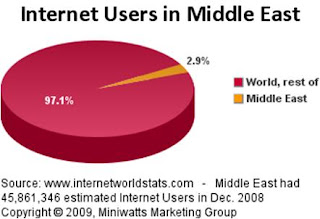The Giant Google is sniffing potential market in the region
The Middle East and North Africa, where Internet usage is relatively low compared to Europe and the US, could see a large growth in Internet penetration rates in 2010, said members of a Google delegation touring the region Thursday.
The four-member delegation is on a fact-finding mission in the Arab world to gauge business opportunities. They have already visited the West Bank and are currently in Lebanon in a tour that will also take them to Jordan, Egypt, Qatar and the United Arab Emirates.
"The Middle East and North Africa hold a very high possibility to be the largest growth region in 2010" when it comes to Internet penetration, said Mohammad Gawdat, Google's managing director for emerging Europe, Middle East and Africa, during an interview in Beirut.
Despite being a relatively heavily populated and oil-rich region, Internet penetration in the Middle East is still small compared to European countries or the United States where penetration rates are as high as 90 per cent.
In the past, telecommunication infrastructure was not very developed in the Arab world, and until recently dial-up service was the only way to access the Internet. Recently, Arab countries have begun offering DSL and ADSL services at cheaper prices making the Internet more widely accessible.
Ahmad S. Hamzawi, Google's engineering manager in the Middle East and North Africa, said Internet usage grew more than 1,000 per cent in the Middle East between 2000 and 2007. But he said it varied widely by country. For example, only about 12 per cent of Egypt's population has Internet access while Internet penetration in the UAE is about 55 per cent.
Gawdat would not give figures on how much money the Mountain View, California-based company plans to invest in the region. Google currently has offices in Egypt, United Arab Emirate and Saudi Arabia, he said.
Gawdat said one of the main problems in the Arab world, or Arabia as its called at Google, is that the region has not traditionally been on the forefront of developing new technologies, but that is beginning to change.
"The biggest challenge that needs to be overcome is for people here to do it [new technologies] first, and some entrepreneurs are beginning to do this," he said.
Another challenge is the lack of information in Arabic on the Internet, said Hamzawi. Less than one per cent of all the information on the web is available in Arabic while Arabic-language users of the Internet account for about 5 per cent of people using the web. He said this shows there is a "thirst for information in Arabic". The delegation members were optimistic about the future of the region.
"There are more 320 million Arabic speakers around the world. It is a significant market by all means," Gawdat said.






